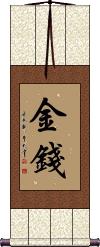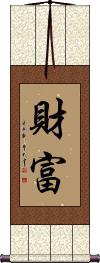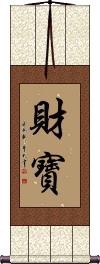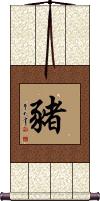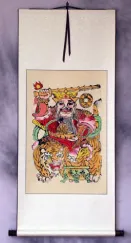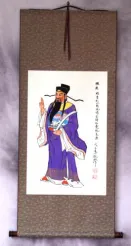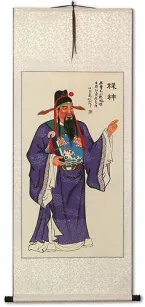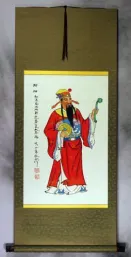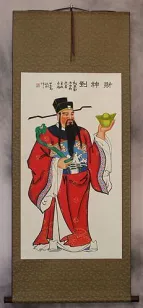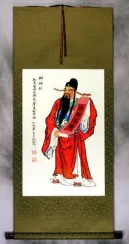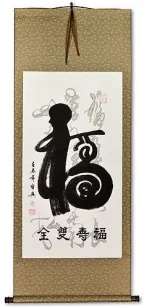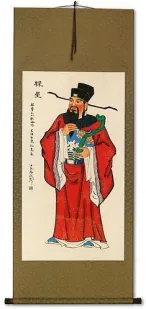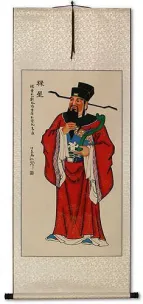Many custom options...
And formats...

Money Wealth in Chinese / Japanese...
Buy a Money Wealth calligraphy wall scroll here!
Personalize your custom “Money Wealth” project by clicking the button next to your favorite “Money Wealth” title below...
Money / Wealth
金錢/金銭 means money, cash, currency, or wealth in Chinese, Japanese Kanji, and old Korean Hanja.
Literally, it means “gold coins” but has come to be used to mean money in general, as well as the idea of wealth.
![]() The second character of this word is written in a variant form in Japan. The more common version in Japan is shown to the right. Click on the Kanji to the right instead of the button above if you want this Japanese variant in your calligraphy.
The second character of this word is written in a variant form in Japan. The more common version in Japan is shown to the right. Click on the Kanji to the right instead of the button above if you want this Japanese variant in your calligraphy.
Wealth / Riches / Fortune
財富 means wealth or riches in Chinese.
Hanging this on your wall will label you as a “lover of money” or a “greedy person.” Order this only if you don't mind being seen in this light.
Treasure
財寶 is the Japanese word meaning “treasure” or “money and valuables.”
The first character means “property,” “money,” “wealth,” or “assets.” The second character means “treasure,” “wealth,” or “valuables” in Japanese. Together these two characters reinforce each other into a word that clearly means treasure in Japanese.
財寶 is also a word meaning “money and valuables” in Chinese but more of a daily use word - not as appropriate for a wall scroll if your audience is Chinese.
![]() The second character shown to the left is the ancient/traditional Japanese version. In modern Japan, this character has been simplified. This simplified version is shown to the right. If you want this modern Japanese/simplified version, just click the Kanji on the right, instead of the button above.
The second character shown to the left is the ancient/traditional Japanese version. In modern Japan, this character has been simplified. This simplified version is shown to the right. If you want this modern Japanese/simplified version, just click the Kanji on the right, instead of the button above.
Boar / Pig
Year of the Pig / Zodiac Sign
豬 is the character for boar, pig, or swine in Chinese and old Korean.
If you were born in the year of the boar/year of the pig, you...
Are optimistic.
Have good luck with wealth and money.
Are honest, generous, and warm-hearted.
![]() The character shown to the right is the Japanese Kanji for "wild boar."
The character shown to the right is the Japanese Kanji for "wild boar."
it’s
an alternate/simplified form of pig/boar in Chinese (can be read by both Chinese and Japanese people). Click on that character instead of the button above if you want this version.
See also our Chinese Zodiac page.
This in-stock artwork might be what you are looking for, and ships right away...
Gallery Price: $108.00
Your Price: $59.88
Gallery Price: $108.00
Your Price: $59.88
Lu Xing
God Of Money & Prosperity
Wall Scroll
Discounted Blemished
Gallery Price: $71.00
Your Price: $39.00
Gallery Price: $120.00
Your Price: $59.88
Gallery Price: $61.00
Your Price: $33.88
Gallery Price: $61.00
Your Price: $33.88
Unique Good Luck Special Calligraphy Wall Scroll
Discounted Blemished
Gallery Price: $31.00
Your Price: $17.00
Gallery Price: $120.00
Your Price: $69.88
Gallery Price: $120.00
Your Price: $59.88
Not the results for money wealth that you were looking for?
Below are some entries from our dictionary that may match your money wealth search...
| Characters If shown, 2nd row is Simp. Chinese |
Pronunciation Romanization |
Simple Dictionary Definition |
財 财 see styles |
cái cai2 ts`ai tsai takara たから |
money; wealth; riches; property; valuables (n,n-suf) (1) fortune; riches; (n,n-suf) (2) goods; (3) (abbreviation) (See 財団法人・ざいだんほうじん) incorporated foundation; (surname) Takara vasu; artha. Wealth, riches. |
斂財 敛财 see styles |
liǎn cái lian3 cai2 lien ts`ai lien tsai |
to accumulate wealth; to rake in money |
新錢 see styles |
xīn qián xin1 qian2 hsin ch`ien hsin chien |
newly minted coin; freshly printed banknote; fresh capital; new investment funds; (coll.) new money; recently acquired wealth; (by metonymy) the nouveau riche |
浮利 see styles |
fú lì fu2 li4 fu li furi ふり |
mere worldly, superficial gain, such as wealth and fame easy money; quick profit |
理財 理财 see styles |
lǐ cái li3 cai2 li ts`ai li tsai rizai りざい |
to manage wealth; to manage finances; money management finance; economy |
財帛 财帛 see styles |
cái bó cai2 bo2 ts`ai po tsai po |
wealth; money |
錢財 钱财 see styles |
qián cái qian2 cai2 ch`ien ts`ai chien tsai senzai |
wealth; money rich and poor |
一代分限 see styles |
ichidaibungen; ichidaibugen いちだいぶんげん; いちだいぶげん |
new money; nouveau riche; person who has amassed substantial wealth in his lifetime |
坐吃山空 see styles |
zuò chī shān kōng zuo4 chi1 shan1 kong1 tso ch`ih shan k`ung tso chih shan kung |
lit. just sitting and eating, one can deplete even a mountain of wealth (idiom); fig. to spend one's money without generating any income |
生財有道 生财有道 see styles |
shēng cái yǒu dào sheng1 cai2 you3 dao4 sheng ts`ai yu tao sheng tsai yu tao |
lit. there are principles behind making money (idiom); fig. to have a knack for good business; knowing how to accumulate wealth; good at feathering one's own nest |
金錢掛帥 金钱挂帅 see styles |
jīn qián guà shuài jin1 qian2 gua4 shuai4 chin ch`ien kua shuai chin chien kua shuai |
caring only about money and wealth |
Variations: |
zainou / zaino ざいのう |
(1) (rare) purse; money bag; wallet; (2) (rare) wealth; money possessed |
Variations: |
narikin なりきん |
(noun - becomes adjective with の) (1) (derogatory term) upstart; nouveau riche; new money; new rich; coming into wealth suddenly; (2) {shogi} (orig. meaning) piece promoted to gold general |
金の切れ目が縁の切れ目 see styles |
kanenokiremegaennokireme かねのきれめがえんのきれめ |
(expression) (proverb) relationships (formed by wealth) will end when the money ends |
Variations: |
kanenokiremegaennokireme(金no切re目ga縁no切re目); kanenokiremegaennokireme(kaneno切re目ga縁no切re目) かねのきれめがえんのきれめ(金の切れ目が縁の切れ目); カネのきれめがえんのきれめ(カネの切れ目が縁の切れ目) |
(expression) (proverb) relationships formed by wealth will end when the money ends; the relationship ends when the money runs out; the end of money is the end of love |
The following table may be helpful for those studying Chinese or Japanese...
| Title | Characters | Romaji (Romanized Japanese) | Various forms of Romanized Chinese | |
| Money Wealth | 金錢 / 金銭 金钱 | kin sen / kinsen | jīn qián / jin1 qian2 / jin qian / jinqian | chin ch`ien / chinchien / chin chien |
| Wealth Riches Fortune | 財富 财富 | cái fù / cai2 fu4 / cai fu / caifu | ts`ai fu / tsaifu / tsai fu | |
| Treasure | 財寶 财宝 | zaihou / zaiho | cái bǎo / cai2 bao3 / cai bao / caibao | ts`ai pao / tsaipao / tsai pao |
| Boar Pig | 豬 猪 | inoshishi | zhū / zhu1 / zhu | chu |
| In some entries above you will see that characters have different versions above and below a line. In these cases, the characters above the line are Traditional Chinese, while the ones below are Simplified Chinese. | ||||
Successful Chinese Character and Japanese Kanji calligraphy searches within the last few hours...
